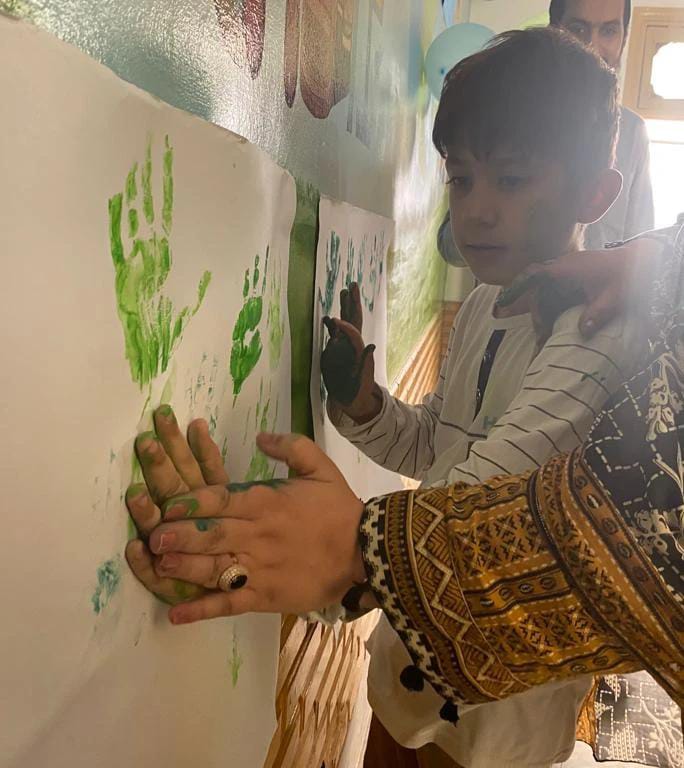On February 16, 2024, Syed Arsalan Hashmi, an engineer from the Bannu district of Khyber Pakhtunkhwa, welcomed his first child, a cute baby boy. The couple named him Azlan and got fully engaged in caring for their son.
“Life was going smooth, and our son was growing normal with expressing his liking for different things but was unable to start talking,” relates Arsalan. He used to say single words, and we hoped he would start talking over time.
While recollecting childhood memories of Azan, Arsalan Hashmi said he used to speak the names of things like car, cat, candy, etc., but could not express his feelings. Azan’s inability to start chatting even on his third birthday made his parents deeply concerned, and they decided to take the child to doctors for check-ups.
Medical practitioners diagnosed Azan with Autism Spectrum Disorder (ASD), a complex neuro-developmental disorder that affects a child’s communication, socialization, and cognition. The diagnosis of neurological disease was nothing more than a bombshell for both Arsalan and his spouse, which turned their sentiments of contentment into feelings of deep gloom and worry.
Parent’s woes due to lack of treatment facilities for autistic children
“Our distress was exacerbated manifold when we came across that no pediatrician in Bannu can treat artistic children, and we have to take Azan to big cities for rehabilitation through `Applied Behavior Analysts (ABA).”
The desperate parents found an Autism center in Karachi and rushed there with the hope of getting him cured. Arsalan used to take Azan four times a month to Karachi from Bannu for therapies. After six months of extensive traveling, he gave up due to enormous physical exertion for both the father and son and a substantial financial burden.
After a little pause, Arsalan took Azan to an autism center in Lahore. The Lahore Autism Center was a public sector entity catering to a large number of patients from Punjab; Arsalan realized after a few visits that his son could not get proper treatment there due to limited examination by therapists.
Meanwhile, a privately run Talha Autism Center in Peshawar grabbed Arsalan’s attention, and he started visiting the provincial metropolis every week for a few months. Observing slight improvement in the child, Arsalan and his spouse took a bold step, leaving their spacious Bannu home and renting a Peshawar.
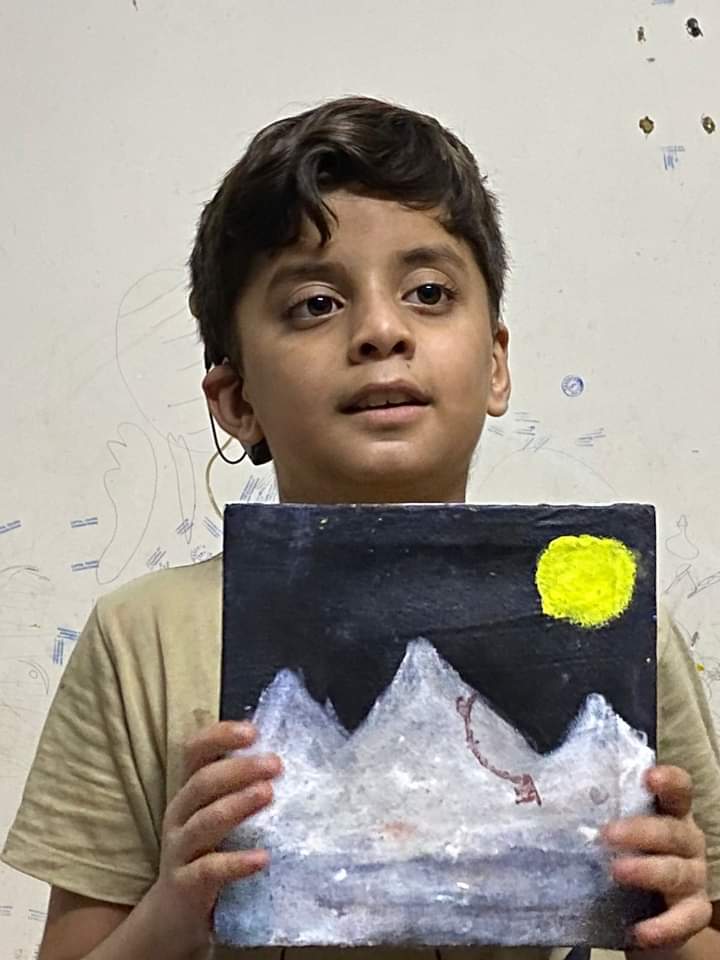
“Parents of autistic children in Pakistan are caught between a rock and deep sea due to the very high cost of treatment and mental stress they endure due to lack of proper cure facilities in their hometowns,” Arsalan shared his inner sentiments.
“The life of parents with an autistic child is harrowing with huge mental toll,” said Mrs. Imran, mother of a 12-year-old child, Muhammad Yousaf, who has autism and deafness.
Yousaf’s father lives in Dubai for employment; she migrated to Peshawar from Swabi at her parents’ home to treat her son properly at the government-run Autism Center. “My father-in-law sold his land, and I vented my jewelry for Yousaf’s treatment from Islamabad and Peshawar,” Mrs Imran informed.
Dedicated efforts and intense devotion by his mother improved severely autistic Yousaf, who has an innate inclination towards painting and is engaged in expressing his thoughts by spreading colors on paper. Recently, some of Yousaf’s artwork was displayed in an exhibition at Peshawar University, receiving a lot of appreciation and applause from participants.
Autistic children in underprivileged families living on God’s mercy
The hard-to-earn parents are unable to take their kids to other cities for treatment and leave them on God’s mercy, observed Bilawal, a goldsmith by profession and father of an autistic child from the Akhora Khattak area of the Nowshera district.
Bilawal said in his hometown; he found a lot of parents getting their kids treated through traditional healing by religious Pirs and taking them to shrines. Bilawal visited different cities due to the lack of autism treatment facilities in his hometown and finally got his son Mohammad Momin admitted to an Autism Center in Peshawar.
“I take my son three days a week to Peshawar from Akharo Khattak in a privately hired transport service,” shared Bilawal. “The expenses incurred on treatment are beyond my earnings, and I have been burdened with substantial financial debt during the last few years.”
“Lack of cost-effective treatment service for disadvantaged families having children with autism is pushing the patients toward the severity of the illness. They have attacks of aggression, head banging, self-biting, yelling, and confining in seclusion,” observed Muhammad Bilal, Managing Director of Talha Autism Center Peshawar.
Number of Autistic children in Pakistan
According to a study published in September 2023 in the International Journal of Surgery Global Health, no reliable data on the prevalence of ASD in Pakistan is available, as individuals with psychiatric disorders resist going to health professionals due to social stigma, leading to a low number of case reports failing to receive proper care from professionals.
However, the Pakistan Autism Society, while quoting some statistics from South Asia, estimated in 2020 that about 350,000 children have ASD in Pakistan.
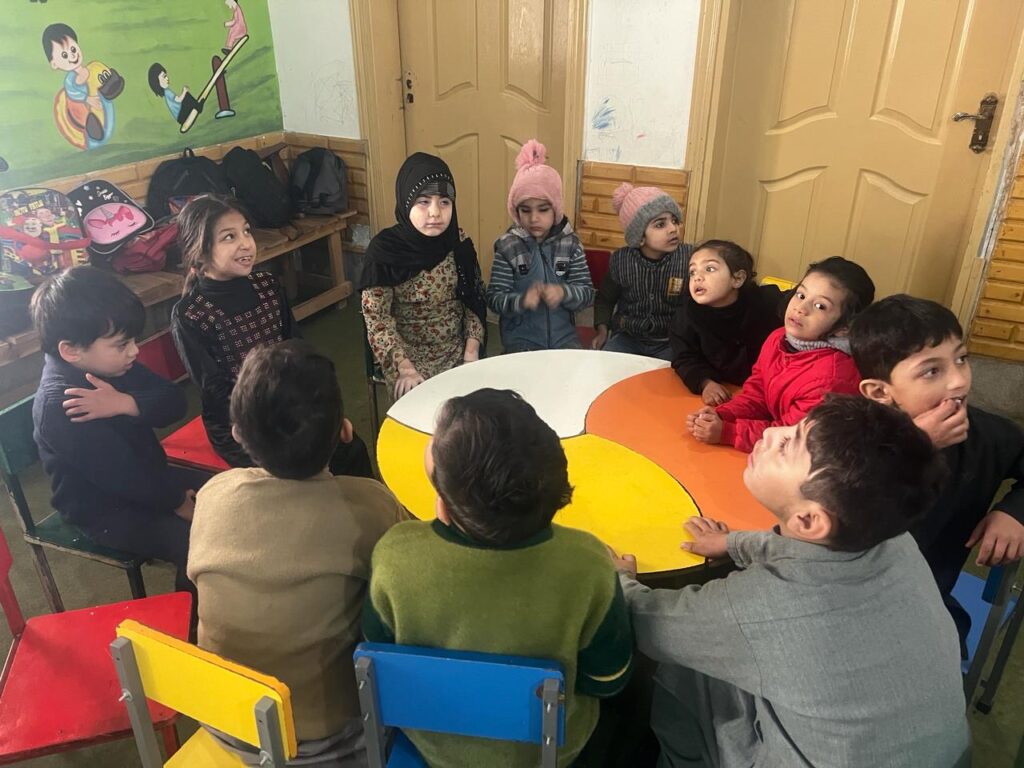
The plight of autistic patients in Khyber Pakhtunkhwa
Several factors have been identified that cause a child to be more likely to have ASD, including environmental, biological, and genetic factors. Experiencing complications at birth or having certain genetic or chromosomal conditions, such as fragile X syndrome or tuberous sclerosis, also causes autism among children. Consanguineous marriage and inter-family marriages are also some genetic factors that contribute to causing autism in children.
According to estimates, there are around 150,000 artistic children in Khyber Pakhtunkhwa who are in dire need of treatment from qualified therapists, observed Dr. Maheen Khattak, an experienced therapist who is the first ever and the only Board Certified Behavior Analyst (BCBA) in KP with additional qualification of Registered Behavior Therapist (RBT) from the US.
“After experiencing the illness of my daughter, I made it a life mission to serve children who have autism. In 2019, I set up a clinic at my home in Peshawar, named `Autism Jewel’,” Maheen told Scientia Pakistan.
“Realizing the increase in the number of children with ASD, the Khyber Pakhtunkhwa government, through the Social Welfare Department, set up an Autism Center in Peshawar to provide cures on free of cost basis,” informs Rizwan Ahmad, Project Director Center for Excellence for Special Children with Autism in KP.
“The center can provide rehabilitation services to 50 children, but we have admitted around 66 patients. They are from Peshawar, Charsadda, Mardan, and even Swabi districts who visit daily, covering a long distance for treatment and therapies,” Rizwan added.
“Dozens of patients are in line, and we receive more admission applications daily. Still, we cannot accommodate all the aspirants until the rehabilitation of the already enrolled children is complete.”
“Autistic patients are getting therapies, including Applied Behavior Analysis, Speech, Occupational, & Sensory Integration, by a staff of around 14 members, including seven psychologists, three speech therapists, three occupational therapists, and one physiotherapist.”
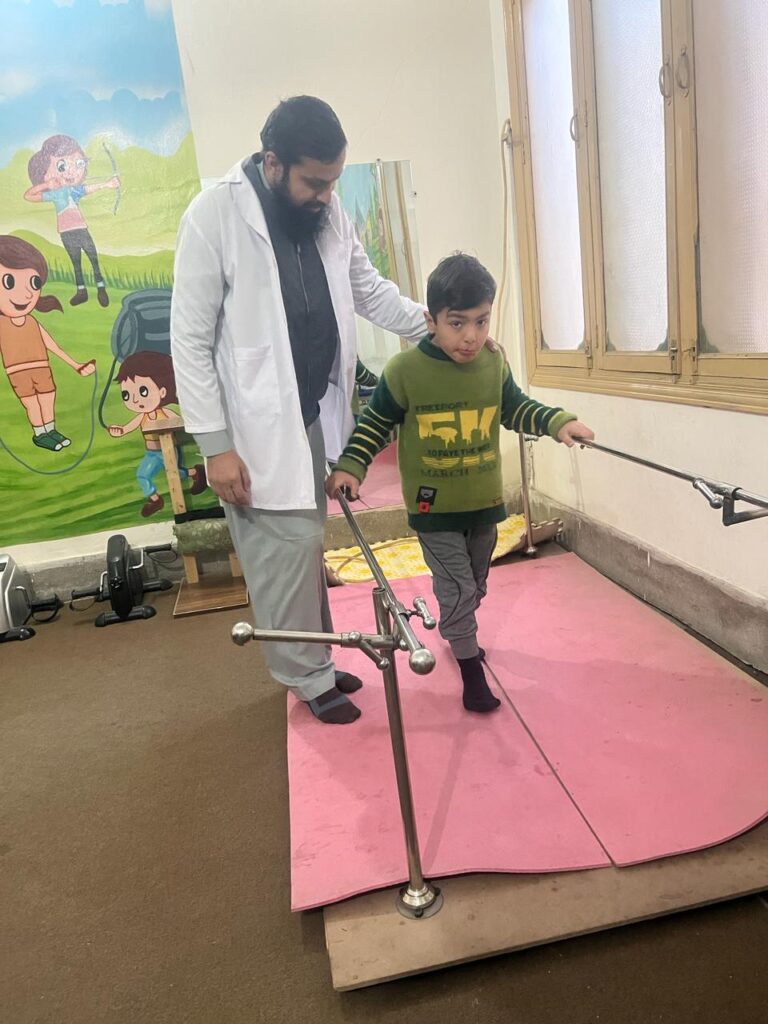
Certified therapists deficiency complicating treatment of autism patients
“Acute paucity of treatment of autism in Khyber Pakhtunkhwa through certified therapists could be gauged from the fact that the government-run Center of Excellence for Special Children with Autism in Peshawar is the only rehabilitation center, functioning under the observation of a qualified BCBA (Board Certified Behavior Analyst),” disclosed Ms. Rutaba, Speech Therapist.
Serving at the government-run Autism Center in Peshawar, Rutaba said the majority of private rehabilitation centers lack facilities of quality treatment through certified therapists but are functioning and charging enormous amounts from parents.
In Khyber Pakhtunkhwa, there is no such rehabilitation center for the cure of adolescents with autism, while the majority of private centers are admitting elderly autistic patients and receiving treatment charges, claims Maryam Jehangir, another psychologist who is also doing an online course on International Behavior Analyst (IBA) from an American institute. Even the Center of Excellence for Special Children with Autism in Peshawar has the facilities for rehabilitating children up to the age of 12 years and cannot provide service to adolescents, she added.
Lack of awareness causes delayed diagnosis of autism in children
“Early diagnosis and proper treatment could minimize adverse effects of the disease, but due to lack of awareness, parents recognize neurological disorders at later stages,” pinpointed Madam Tahira, a psychologist at Autism Center Peshawar.
She said diagnosis is also a very skillful practice, and Dr. Maheen is the only specialist in Khyber Pakhtunkhwa who can do an Autism Diagnostic Observation Schedule (ADOS-2) test for diagnosis of autism at an early stage. Due to the lack of diagnosis facilities, all the patients in Khyber Pakhtunkhwa are sent to Islamabad and Lahore for diagnosis.
Exorbitant fees deprive parents of getting their autistic children treated at private centers
“Parents of autistic children establish the majority of private autism centers, but unfortunately, the treatment they offer is costly and beyond the reach of the lower/ middle class. The minimum fee they demand is around 60,000 PKR (215.23$) for one month’s treatment,” laments Rizwan Ahmad, Project Director of the Center for Excellence for Special Children with Autism in KP.
The government should announce a subsidy as a token of support for those parents who cannot afford fees at private autism centers for the rehabilitation of their children, he suggested. A plan is also under consideration by the Social Welfare Department of KP to pay stipends monthly to children admitted at the Center for Excellence for Special Children with Autism.
The number of children affected by autism is rapidly increasing across the country, and this is the need of the hour to set up welfare-oriented Autism Centers, at least at the divisional level, Rizwan stressed.
“The humanitarian organizations serving in the country should consider the hardships faced by hard-to-earn parents in getting their children rehabilitated due to the high cost of treatment and extend financial support to them,” Rizwan suggested.
EKKO Wave Therapeutic Device- A ray of hope
A recent invention of a device, `EKKO Wave Therapeutic Device’ by a team of biomedical researchers from the National University of Science and Technology (NUST) in Pakistan, provided hope in treating developmental neuro disability. EKKO, the winner of the 2023 Better World Project Award, is a non-invasive, mobile therapy that takes concepts used for the treatment of muscles and applies them to the brain, informs Dr. Muhammad Usman Akram, who is in charge of the project.
Taking to Scientia Pakistan, Dr. Usman said around 150 parents are using EKKO devices at home and are sharing good results in the rehabilitation of their autistic children. The price of a device used at home is around PRK 50,000 (US dollars 179), and its vibrational waves aid in the fast recovery of muscles because of their resonance with the natural frequencies of the muscle fibers.
The EKKO improves patient access to treatment for symptoms like tongue dysarthria, motor speech aphasia/dysphasia, tongue apraxia, cerebral palsy, and eye squints. About marketing of EKKO, Dr. Usman said the NUST Technology Transfer Office is working with various departments and stakeholders and, in this connection, would also approach Autism Treatment centers in Khyber Pakhtunkhwa.
Similar Posts: AI and Neurobiology: Understanding the Brain through Computational Models
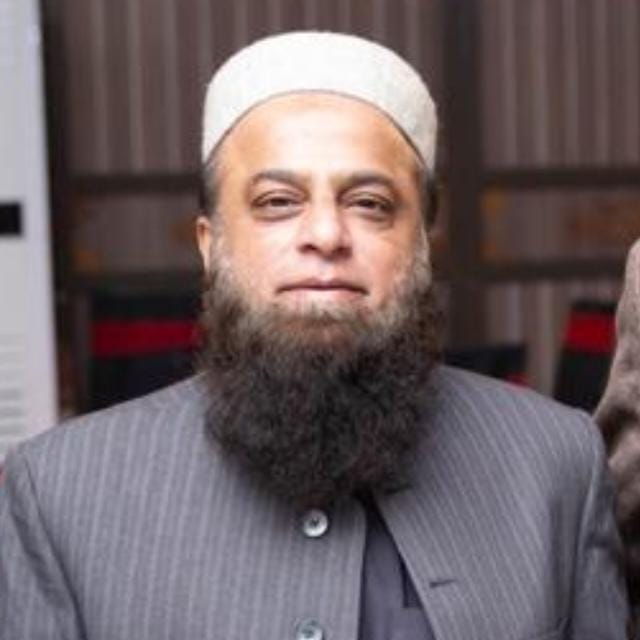
Adeel Saeed is a Peshawar-based journalist with an interest in environmental stories. He also concentrates on issues of public health concern, mental health, drug addiction, gender equality, and transgender rights.
